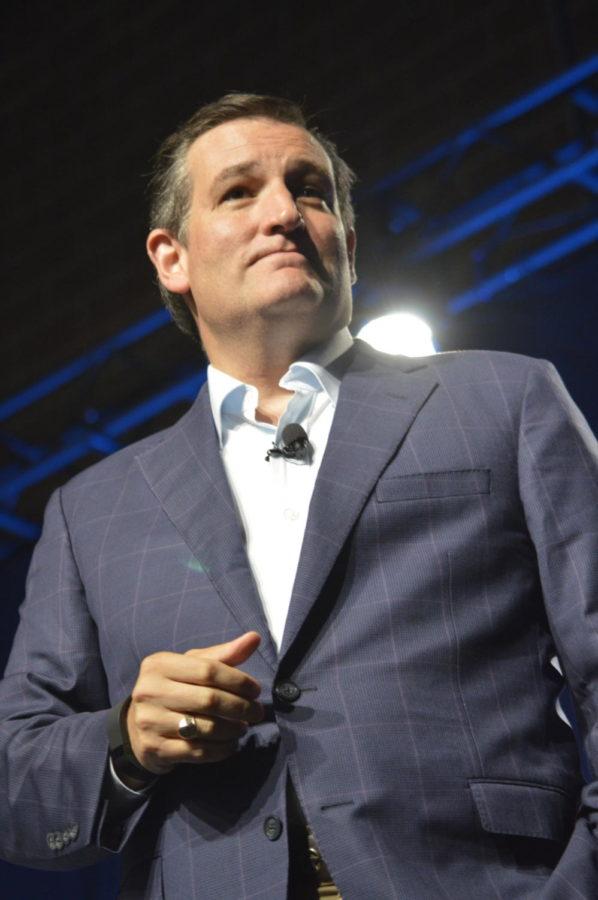Ted Cruz gains momentum after debate
November 2, 2015
Three large takeaways arose after the Republican’s third debate last week: Jeb Bush and Marco Rubio know how to spar; Democratic candidate Hillary Clinton is the root of all Republican woes; and Sen. Ted Cruz, R-Texas, can take on more than his own party.
Cruz criticized the the media and CNBC’s moderators for what he said was biased and unfocused questions.
“The questions that have been asked so far in this debate illustrate why the American people don’t trust the media,” Cruz said. “This is not a cage match. And, you look at the questions — ‘Donald Trump, are you a comic-book villain?’ ‘Ben Carson, can you do math?’ ‘John Kasich, will you insult two people over here?’ ‘Marco Rubio, why don’t you resign?’ ‘Jeb Bush, why have your numbers fallen?’ How about talking about the substantive issues the people care about?”
And while the debate overall was met with plenty of criticism regarding the moderators’ questions, Cruz’s critiques on the matter were met with great applause and fervor from not only the audience but also the candidates. Some political analysts would argue this is one of the first times the GOP has come together for a common goal.
“They started to pick on the press instead of each other,” said Kelly Shaw, lecturer in political science.
“It was a terrible debate from CNBC and the shameless moderators, said state Rep. Ralph Watts, R-Adel, a Cruz supporter. “It was not appropriate at all, I do not have enough words to discuss my distaste. [Cruz] did a good job about it, he showed leadership and brought fight and resolve from other candidates.”
State Sen. Dennis Guth, R-Klemme, who has also endorsed Cruz, agreed that the debate was not structured well.
“Comments about the moderators, those were well spoken and long overdue,” Guth said. “Too much of the Republican debate has been guided by organizations that wouldn’t even vote GOP. The debates should be among conservatives by conservatives for conservative issues.”
Cruz’s fiery nature during the most recent debate was not a new behavior for him. He’s repeatedly said he will “take on” his own party and continues to show his consistency toward issues.
“The stir he caused, he’s always been that way,” Guth said. “The people of Iowa are beginning to understand Sen. Cruz is not a candidate that is fluid or always changing.”
Watts says Cruz’s consistency will help him stay afloat.
“His game plan has always been consistent,” Watts said. “He’s had a consistent message and consistent effort throughout this whole thing.”
Shaw believes Cruz’s concerns will enact a change for how future debates will take place.
“CNBC wanted to create an appealing media event that backfired on them,” Shaw said. “Moving forward, there will likely be more informed questions, more focused debate … because everything hit the fan [and] it’ll be more policy based than what it was.”
Riding momentum after the debate, a new NBC/WSJ poll released Monday night showed Cruz in fourth place nationally, behind Carson, Rubio and Trump. In order to keep his place, Watts thinks more candidates need to drop out so Cruz can shine.
“We need to get down to at least five candidates until we see a substantive discussion on issues,” Watts said.
Shaw disagrees, however, saying that the race to the presidency is a “marathon, not a sprint” and that more policy discussion will come with time.
“These candidates are polished persons, so I think we’ll see more of a focus [after the debate], whether it’s four or 14 candidates,” Shaw said.
The two leaders in the GOP, Donald Trump and Ben Carson, are outsiders to the political world, which is why Cruz could be below them, Shaw said.
“Republican voters right now have anti-insider approach and we will start to see that romance will wear off,” Shaw said.
Guth said the reason Cruz is not in front because he’s not an outsider. He added that Cruz, however, is more of an outsider than an insider among the other candidates.
Something that Guth, Shaw and Watts can all agree on is that after Cruz’s post-debate momentum and less than 100 days until caucus season, he needs to start spending more time in Iowa.
“The more time he spends in Iowa, the better,” Guth said.







